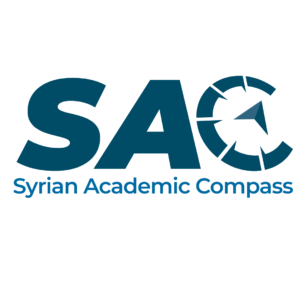
By: Mustafa Karahamad and Dr. Yamen Alsalka
The Syrian Academic Compass (SAC) project aims to empower Syrian academics in Syria and abroad.
We want to help recent graduates from Syrian universities navigate their academic and career paths outside of Syria, if they are interested in working or continuing their academic careers abroad.
This report focuses on graduates from Syrian universities, who have graduated from one of the languages departments. If you want to replicate the same case study in other fields, please contact the project’s Scrum Master Mustafa Karahamad, or send an email to the Society’s email address: info@ds-fg.com.
If you are a graduate of one of the language departments and want to add your story to the ones we are reporting, it is not too late, we will re-analyze the data collected regularly. please find the survey at the following link.
Please note that DSFG will collect your data in the survey only for the SAC project and will not use or share it for any other purpose. Personal details are optional.
The latest update of the data collected: 18.12.2024
Next update: End of March 2025
Introduction to the results of the languages departments report
This report is the outcome of the case study conducted by the Syrian Academic Compass project’s volunteering researchers. Utilizing descriptive research methods, particularly surveys designed on Google Forms, which is a research method focused on describing the features, behaviors, or conditions of a specific target group. The case study aims to answer the following research question:
How do language department graduates from Syrian universities pursue their academic and career paths after migrating outside Syria?
The case study doesn’t aim to test hypotheses, make predictions, or claim generalizations over the target group; but rather to capture a snapshot of the group’s responses or characteristics. The societal aim marks the relevance of the case study in accordance with the project’s aims described above, namely helping recent graduates from Syria better navigate their academic and career landscape outside, from the lenses of other graduates.
This case study aimed to survey bachelor graduates from any language department in any Syrian university who have pursued their careers outside Syria, mainly in Europe, Asia, and North America.
The majority of respondents (89%) had a Bachelor’s degree in English literature. Holders of Bachelor’s degrees in French and Arabic literature were 5.5% each. Almost 61% of the respondents graduated between 2011 and 2016, the second most represented respondents in the survey graduated between 2005 and 2010 (22%).
The majority of respondents (78%) graduated from Damascus University. Bachelor’s degrees from Al-Baath University was 11% and from Tishreen, and Al-Furat Universities were 5.5% each. Almost 78% of respondents migrated outside Syria between 2011 and 2022. Around 56% of respondents migrated twice, while around 33% migrated only once outside Syria. The majority of Syrian academics surveyed now live in Germany (39%), Turkey (17%), and the UK (11%).
The report will present the survey result in three phases, following the logic of the survey.
First Phase: In Syria
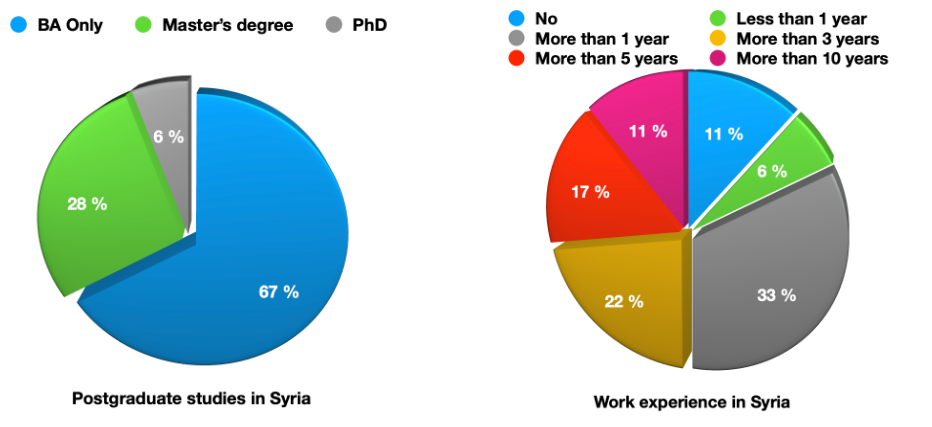
Around 67% of the respondents only completed a bachelor’s degree in Syria, while almost 28% of the respondents completed a Master’s degree (MA) in Syria before migrating. Those who pursued an MA in Syria majored in various fields, but mostly in (1) literature, (2) management. Other fields were less frequent but equally represented: Linguistics; translation; culture; politics; public relations; communication; media.
Answering whether respondents had any work experience in Syria before migrating, only 11% expressed that they had no work experience before migrating. Exactly half of respondents had more than 3 years of work experience in Syria, while 28% of which had more than 5 years of work experience in Syria.
Second Phase: First Years after Migrating
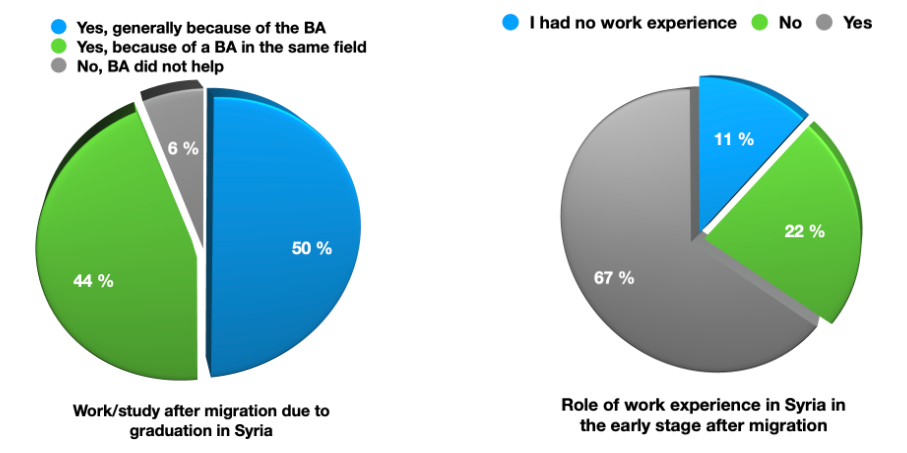
A degree from Syria has a positive impact on the post-migration academic or career path of 94% of the Syrian respondents. In addition, 44% worked or studied because they had a BA in their particular field (disciplinary path), while 50% expressed that having a BA in general helped in shaping their future, indicating that they followed interdisciplinary paths by working or studying in other fields.
Work experience in Syria improved the chances of 67% of respondents in their early post-migration stage.
Around 61% of the responses received show that the participants pursued various types of further education after traveling abroad (academic or vocational training). However, the majority of responses (around 45%) show that participants completed a post-travel MA to start their early career path after travelling.
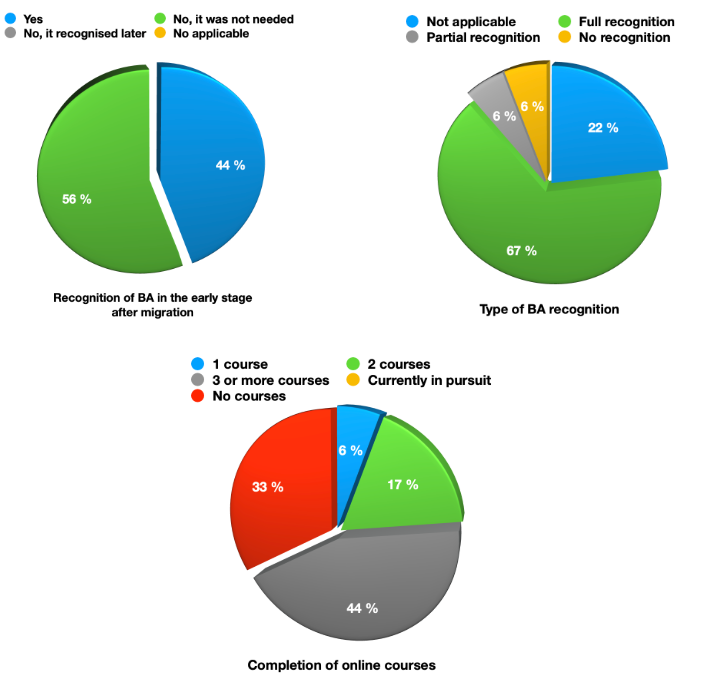
For 56% of respondents, recognition of the bachelor’s degree by the authorities in the migration country was not necessary.
Of those who did have their degrees recognised, 67% received full recognition.
Syrian graduates from languages departments have been active in taking online courses to improve their skills. 67% of respondents took at least one online course to improve their skills, with 44% of total respondents who took more than three online courses.
Third Phase: Situation in the Destination Country
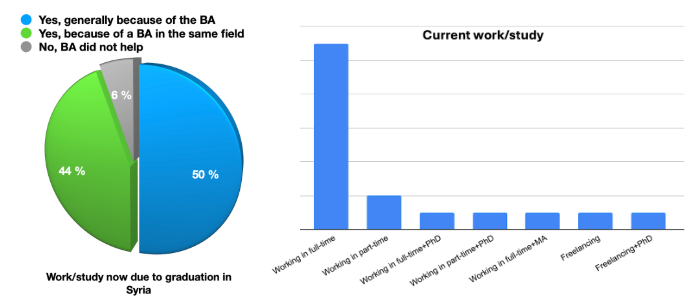
Completing a bachelor’s degree in Syria helps the majority (94%) of respondents to work or study in their destination country after migration, regardless of the relationship between the field of work or study and the field of graduation.
More than half of the respondents are working or studying in the country where they are living because they have a bachelor’s degree in general (interdisciplinary path), while the others said they are working or studying because of having a bachelor’s particularly in their field of study (disciplinary path).
The majority of the respondents said that they are currently working full-time; others said they are working part-time or freelancing next to doing a PhD or an MA degree.
In the destination country after migration, the majority of respondents (72%) were employed at the time of filling out the questionnaire. About 45% of respondents had completed or were about to complete a university degree in the destination country at the time of filling out the survey. They studied one of the following majors: Politics, Linguistics, Literature, Translation, Culture and Media
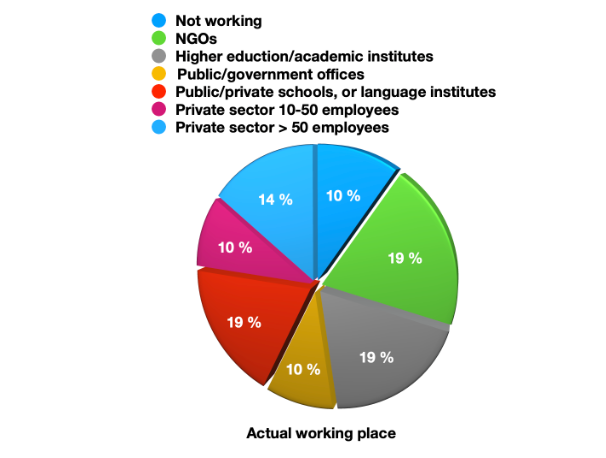
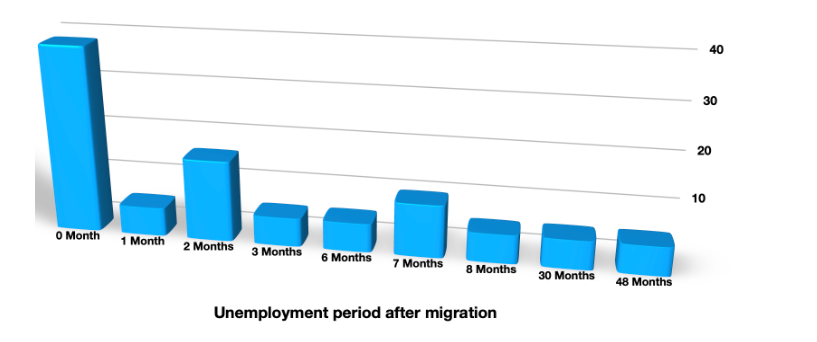
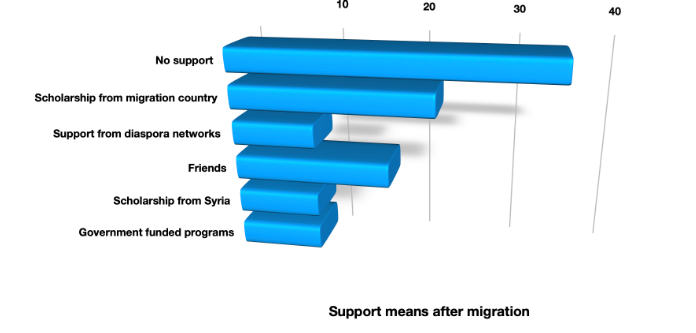
Most respondents (24%) said they were working in the private sector at the time of filling out the survey, either in large companies with more than 50 employees or in companies with less than 50 employees. Three types of employment were equally represented among respondents (19% each): working in higher education institutions; working in public or private schools; and working for NGOs or UN organisations.
Regarding working domains, five domains were equally represented among respondents: consultation, public relation, translation, and administration; with 9% for each. Three domains were also equally represented among respondents: management, project coordination, and training; with 13% for each. With 17%, research was the most representative. Other working domains are social media and teaching.
When asked about periods of unemployment, 39% of respondents said that they started to work/study immediately after migration. 52% said that they started to work/study within a year of migration. Others expressed longer periods of unemployment reaching 30 months and 48 months.
The majority of respondents received some kind of support in the country where they live, this varied from scholarships (from home country or from destination country) to support from government programs or diaspora networks and societies in the country where they are living. However, 35% said that they received no support.
Conclusion
- The report presents the results of a case study to explore how graduates of language departments (mostly English literature) from Syrian universities pursue their academic and career paths after migrating outside Syria.
- The majority of respondents have only completed a BA in Syria with more than one year of work experience before migrating.
- The survey indicates that a BA and work experience in Syria have a tangible impact on post-migration pathways, particularly in the professional pathways.
- Postgraduate study was the route taken by the majority of respondents.
- Recognition of the BA was not essentially required for the respondents in the countries of migration.
- Almost half of the respondents pursued work/study paths in their fields of study, while the other half pursued interdisciplinary paths in other career/study choices. Still, having a BA was central for both.
- The survey shows that the private sector and research institutes are the most common places of work for respondents.
- Some respondents directly started working/studying after migrating, while most respondents were able to start studying or working within one year after migration.
- The majority of respondents received financial and/or advisory support from different organizations after migration.
